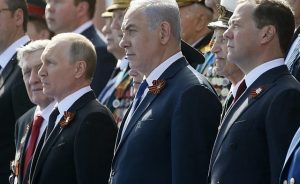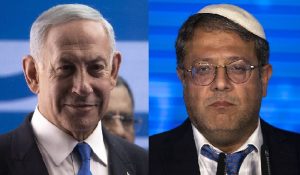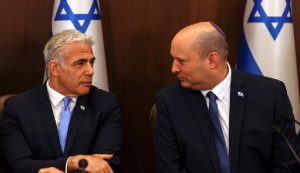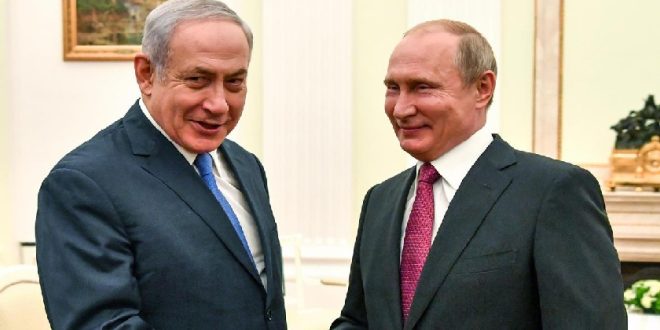13-01-2023
JERUSALEM/ MOSCOW: Israel’s new government, led by Prime Minister Benjamin Netanyahu, has primarily made headlines domestically, and for its policies towards Palestinians, since coming into power late last year but on foreign policy, particularly regarding Russia’s war in Ukraine, some argue that Israel’s most right-wing government yet is inclined to deviate from its predecessor’s path.
 Take the new foreign minister’s first public speech, on January 2.
Take the new foreign minister’s first public speech, on January 2.
Among other things, Eli Cohen said the new government would “talk less” when it came to Russia and Ukraine, implying that the administration would avoid taking public positions on the conflict.
Cohen also spoke to his Russian counterpart Sergey Lavrov before speaking to Ukrainian foreign minister Dmytro Kuleba, a decision that upset the Ukrainians, with the ambassador to Israel saying that the phone call was evidence Israel was changing course under Netanyahu.
“The difference between the two governments is that the previous government was 100 percent ideologically sympathetic to Ukraine and sought to support Ukraine as much as it could, without totally alienating the Russians,” Jonathan Rynhold, head of political studies at Bar-Ilan University, told media.
“This government is less concerned about ideological sympathies. They are not invested in seeing democracy trump dictatorship, nor would they be necessarily happy to see international sanctions succeed, as they might fear a precedent,” Rynhold added, alluding to a global grassroots movement pushing for sanctions against Israel itself for its continued occupation of Palestinian territory.
 It now appears as though the new Israeli government is trying to send more positive signals to Russia while continuing its own long-lasting foreign policy doctrines.
It now appears as though the new Israeli government is trying to send more positive signals to Russia while continuing its own long-lasting foreign policy doctrines.
“Israel has two core national security interests regarding Russia and Ukraine which are consensual in Israel: The maintenance of good relations with the United States in a general sense, and Russian acceptance of Israel’s freedom to operate militarily against Iranian forces, rocket launching sites and arms smuggling in Syria,” Rynhold noted.
“This requires active coordination with Russia in order to avoid a clash between Russian and Israeli forces. The current and previous governments have sought to balance these objectives,” he added.
Harder to balance
Israel’s relationship with Russia has become increasingly complicated, even difficult, due to the war.
“Prior to the war, Israel’s foreign policy concerning the two countries entailed relations in many fields and was always seeking to get stronger,” said Yonatan Freeman, international relations expert at the Hebrew University of Jerusalem.
 “Both countries still have large Jewish populations, and hundreds of thousands of Israelis have family connections to those still living there. Moreover, there has been strong trade in the fields of agriculture, tourism links and even the high-tech industry.”
“Both countries still have large Jewish populations, and hundreds of thousands of Israelis have family connections to those still living there. Moreover, there has been strong trade in the fields of agriculture, tourism links and even the high-tech industry.”
Besides those factors, Israel and Russia also coordinate on security matters related to Syria.
Israel has therefore, even before the arrival of Netanyahu’s government, walked a tightrope since the beginning of the war in Ukraine.
On the one hand, it considers itself part of the Western camp and, for that reason, was pressured to reject and condemn Russia’s war and alleged crimes. On the other, it has categorically refused to take a clear stand and has declined every request to deliver weapons to Ukraine.
Unlike Europe or its primary ally, the United States, Israel only supplies humanitarian aid as well as some defensive equipment such as helmets and protective vests.
Kyiv expressed its frustration in December when Israel did not receive an invitation to Ukraine’s solidarity conference in Paris.
 Israel is always likely to be careful when it comes to Russia, regardless of the prime minister in charge but some experts say it has done far more than is publicly known.
Israel is always likely to be careful when it comes to Russia, regardless of the prime minister in charge but some experts say it has done far more than is publicly known.
“As the war has continued, Israel has taken increased action, mainly behind the scenes, to join or consider some of the financial constraints placed on Russia by the West,” Freeman said. “In addition, Israel has increased the aid it has given Ukraine, even recently providing electric generators and treating injured Ukrainian soldiers in Israel.
“According to some reports, Israel may be possibly assisting Ukraine in knowhow on how to intercept, using electronic means, Iranian drones, and well as allowing Israeli territory to be used as a transit point for shipments to Ukraine by others, or its airspace for which reconnaissance aircraft of sorts, by others, can fly through to get to the war-zone.” (Int’l News Desk)
 Pressmediaofindia
Pressmediaofindia




